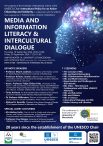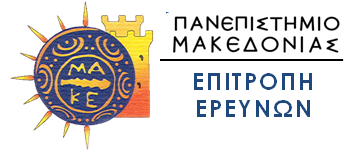The University of Macedonia, as an associate member of the UNESCO/UNAOC MILID University Network, will participate in the UNESCO Global Media and Information Week by presenting online the videos of the two international conferences it co-organized on 19-21 September 2024 in Thessaloniki:
- The third International Student Conference on Media and Information Literacy and Intercultural Dialogue, co-organized by the student interns at the UNESCO Chair of Intercultural Policy for an Active Citizenship of the University of Macedonia and financed by the University of Macedonia.
- The International Conference “Enhancing European Citizens’ Media and Information Literacy to Confront Hate Speech and Mis- Disinformation”, co-organized by the UNESCO Chair of Intercultural Policy for an Active Citizenship of the University of Macedonia in Thessaloniki and the UNESCO Chair “Savoir Devenir in a Sustainable Digital Environment” of the University Sorbonne Nouvelle in Paris. The conference was financed by the Research Committee of the University of Macedonia.
The videos of the presentations of the two international conferences have been uploaded on the youtube channel of the UNESCO Chair on 6-7 November and 8 November 2024 in the framework of the Global MIL Week on 24-31 October, 2024.
These conferences took place under the auspices of the Hellenic National Commission for UNESCO and were welcomed by its President Mrs Aikaterini Tzitzikosta as follows:
MESSAGE BY THE PRESIDENT OF THE HELLENIC NATIONAL COMMISSION FOR UNESCO,
MS EKATERINI TZITZIKOSTA
3RD INTERNATIONAL CONFERENCE MEDIA, INFORMATION LITERACY AND INTERCULTURAL DIALOGUE
Dear Professors, Distinguished speakers and guests,
I am deeply honored to greet you all, in my capacity as President of the Hellenic National Commission for UNESCO, on the occasion of the 3rd International Student Conference entitled: Media, Information Literacy and Intercultural Dialogue, which is organized by the UNESCO Chair in Intercultural Policy for an Active Citizenship and Solidarity of the University of Macedonia.
UNESCO, the United Nations Organization for Education, Culture, Science and Communication, supports the development of Media and Digital Competencies for all, working to enable people to navigate the online environment critically, safely and responsibly. Through its Programmes, seminars, Conferences, publications and training, UNESCO strives to empower citizens, sensitize governments and communities, educate academics, researchers, teachers and most importantly, youth.
The 2030 Agenda places young people at the center of its vision. Today’s generation of youth is the largest the world has ever known. 1 in every 3 people alive today is under the age of thirty, and around 90% of young people are living in developing countries, mainly Asia and Africa.
Youth are more digitally informed and more connected than any other generation before. They are the ones to diffuse and implement the sustainable development goals. They are the ambassadors of peace, multicultural dialogue, non-violence, equality, freedom of speech and citizen participation. They can bring change in the way we live, behave, produce, and invest. They can make a huge difference through creativity, innovation and research.
In an era, where many are highlighting the elements that separate cultures, UNESCO stands against this confrontational logic and strongly endeavours to promote those elements which unite cultures, through dialogue. This constructive dialogue however, requires substantial knowledge of the different cultures and their traditions with a view to giving the opportunity to all peoples to co-exist harmoniously, to prosper, to create and to dream.
Thank you.
THIRD INTERNATIONAL STUDENT CONFERENCE
The Conference was financed by the University of Macedonia.
ORGANISING STUDENT COMMITTEE
The Organizing Student Committee:
● Anastasia Psallida, Ph.D. Candidate, Department of International and European Studies, University of Macedonia, Educator (MA Sociology AUTh, MA European Policies on Youth, Entrepreneurship, Education and Culture, UoM), Research Associate of the UNESCO Chair for Intercultural Policy and Internship Coordinator under the supervision of Professor D, Anagnostopoulou (Director of the UNESCO Chair for Intercultural Policy),
● Malvina Kontou, Lawyer, Ph.D. Candidate, Department of International and European Studies, University of Macedonia, H.F.R.I. Scholar
● Konstantina Kartali, Lawyer, Postgraduate Student, Master’s Program “European Policies on Youth, Entrepreneurship, Education and Culture”, Department of International and European Studies, University of Macedonia
● Eleftheria Nantsiou, Postgraduate Student, Master’s Program “International Studies”, Department of International and European Studies, University of Macedonia
● Aikaterini Markidou, Undergraduate Student, Department of International and European Studies, University of Macedonia
Academic Coordinator:
● Despoina Anagnostopoulou, Professor, Department of International and European Studies, University of Macedonia, Director of the UNESCO Chair “Intercultural Policy for an Active Citizenship and Solidarity”
The Scientific Committee of the Student Conference:
● Despoina Anagnostopoulou, Professor, Department of International and European Studies, University of Macedonia
● Foteini Bellou, Associate Professor, Department of International and European Studies, University of Macedonia
● Sofia Boutsiouki, Assistant Professor, Department of International and European Studies, University of Macedonia
Please find below the recordings of DAY ONE and TWO of the Third International Student Conference which were edited by Mr Marios Nosios.
3rd International Student Conference on Media and Information Literacy: Day One – Recordings
3rd International Student Conference on Media and Information Literacy: Day Two – first half – Recordings
3rd International Student Conference on Media and Information Literacy: Day Two – second half – Recordings
INTERNATIONAL CONFERENCE “ENHANCING CITIZENS’ MEDIA AND INFORMATION LITERACY TO CONFRONT HATE SPEECH AND MIS-DISINFORMATION: THE ROLE OF UNESCO AND EU”

The Conference was financed by the Research Committee of the University of Macedonia and was co-organized with the UNESCO Chair Savoir-Devenir in the Sustainable Digital Era (University Paris III – Sorbonne Nouvelle) on September 21, 2024.
MESSAGE BY THE PRESIDENT OF THE HELLENIC NATIONAL COMMISSION FOR UNESCO, MS EKATERINI TZITZIKOSTA
Dear Professors, Distinguished speakers and guests,
I am deeply honored to greet you all, in my capacity as President of the Hellenic National Commission for UNESCO, on the occasion of the International Conference entitled “Enhancing Citizens Media and Information Literacy to confront Hate Speech and Mis-disinformation”, which is co-organized by the UNESCO Chair in Intercultural Policy for an Active Citizenship and Solidarity of the University of Macedonia.
UNESCO, is working to strengthen democratic values, promote justice, and respect for human rights. Moreover, through intercultural and interfaith dialogue, as well as by fostering mutual understanding and reconciliation, the Organization acts to strengthen a culture of peace, equality and non-violence.
Media and Information Literacy are seen by UNESCO as vehicles to address the challenges of the 21st century, including the proliferation of mis and disinformation and hate speech, the decline of trust in media and Artificial Intelligence. That is why among UNESCO’s priorities is to empower citizens, youth and educators with new skills to speak out and opportunities to act for peaceful change through critical access, analysis, use and consumption of media.
That is why I would like to congratulate the UNESCO Chair for organizing this Conference, a Conference which focuses on important matters that are very important not only to UNESCO but to society as a whole.
Thank you.
Please find below the Conference recordings, edited by Mr Marios Nosios.


